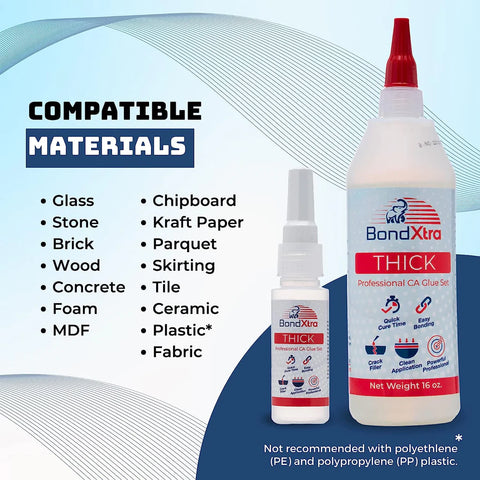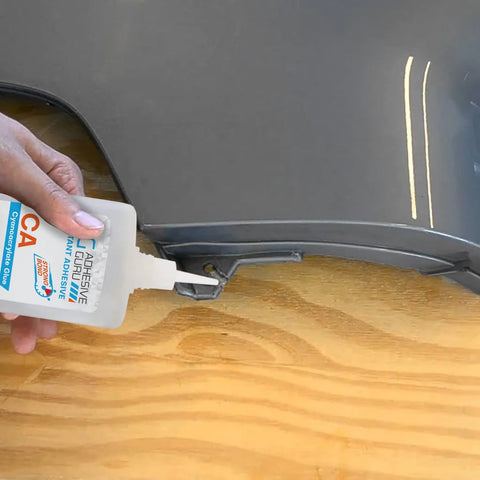The Pros and Cons of Super Glue for Household Repairs
When it comes to household repairs, having the right adhesive can make a significant difference. Super glue, also known as cyanoacrylate adhesive, has gained popularity as a go-to solution for fixing various items around the house. Its strong bonding capabilities and quick-drying nature make it a convenient choice for many DIY enthusiasts. However, like any other product, super glue has its pros and cons. In this article, we will explore the advantages and disadvantages of using super glue for household repairs.
What is Super Glue?
Super glue is a type of fast-acting adhesive that creates a strong bond between various materials. It is composed of cyanoacrylate, a chemical compound that polymerizes rapidly when exposed to moisture. This rapid polymerization process creates a durable and nearly-instant bond.

Advantages of Super Glue
1. Strong Bonding
Super glue is renowned for its exceptional bonding strength, capable of securely joining a variety of materials, including plastics, metals, ceramics, glass, and wood. The adhesive creates a bond that resists impact, vibrations, and everyday wear and tear, making it ideal for long-lasting repairs. Its strength is particularly beneficial for items subject to regular handling or stress, ensuring they remain intact under various conditions.
2. Quick-Drying
Super glue sets and dries rapidly, allowing for swift repairs. Unlike traditional adhesives that require extended drying times, super glue forms a solid bond within seconds. This quick-drying property makes it ideal for urgent fixes or projects that require immediate results.
3. Versatile Application
Super glue’s versatility is unmatched. It's not just limited to minor household repairs; it can be used in crafting, model building, and even in some automotive applications. Its ability to bond a diverse range of materials extends its usefulness beyond the household into various hobbies and professional tasks. Whether it’s for repairing a delicate piece of jewelry or assembling a model airplane, super glue’s versatility makes it a valuable tool in many scenarios.
4. Cost-Effective
In terms of cost, super glue stands out as an economical choice. Its affordability, coupled with its strong adhesive properties, means that a small tube can be used for numerous applications over time. This makes it a cost-effective option for both sporadic home repairs and regular use in more demanding projects.

5. Widely Available
The widespread availability of super glue adds to its appeal. You can easily find it in various forms and formulations, catering to different needs and preferences. Whether you prefer a gel form for vertical applications or a precision tip for intricate work, there’s likely a super glue product available that meets your requirements.
6. Waterproof
Super glue's water-resistant properties make it ideal for repairs in moist environments. Its ability to maintain a strong bond even when exposed to water means it can be confidently used for outdoor repairs, plumbing issues, or in areas like kitchens and bathrooms where moisture is common.

7. Heat and Chemical Resistance
Super glue’s resilience to heat and chemicals broadens its application range significantly. It maintains its bonding strength in environments exposed to moderate heat, such as engine parts or cookware handles, and resists weakening when in contact with various household chemicals, oils, or solvents.
8. Long Shelf Life
The longevity of super glue in storage is a significant benefit. When stored correctly – in a cool, dry place and away from direct sunlight – unopened containers of super glue can last for years. This long shelf life means you can keep super glue on hand for emergencies or infrequent use, confident in its performance when you need it.
9. Precision Application
Modern super glue products often come with precision applicators, such as fine-tipped nozzles or brushes, allowing for accurate and controlled application. This precision is crucial for delicate repairs or when working on small-scale projects, ensuring that the glue is applied exactly where needed without excess spillage or mess.
10. Minimal Clamping Required
Unlike some adhesives that require clamping to hold pieces together while the glue sets, super glue usually requires only brief manual pressure. This convenience means you don’t need additional tools or clamps for most repairs, simplifying the process and making it quicker and more user-friendly.
This article interest may you. What is CA Glue with Activator?
Disadvantages of Super Glue
1. Irreversible Bonding
Once super glue has dried and bonded two surfaces together, it becomes extremely challenging to separate them without causing damage. This irreversible bonding property can be a disadvantage if you need to make adjustments or disassemble the repaired item in the future.
2. Limited Gap-Filling Capability
Super glue works best when used to bond surfaces in close contact with each other. It has limited gap-filling abilities compared to other types of adhesives like epoxy. If you're dealing with uneven or mismatched surfaces, super glue may not provide the desired results.
3. Skin Irritation and Toxicity
Super glue can cause skin irritation if it comes into contact with the skin. It is important to handle it with care and avoid getting it on your hands or fingers. Additionally, some formulations of super glue contain toxic chemicals, so it is essential to read the product labels and follow safety precautions.
4. Potential Damage to Surfaces
While super glue is known for its strong bonding capabilities, it can potentially damage certain surfaces. Delicate materials like foam, fabric, or some types of plastics may be susceptible to discoloration or degradation when exposed to super glue. It is advisable to test a small, inconspicuous area before applying it to the entire surface.
5. Difficulty in Reversing the Bond
As mentioned earlier, super glue forms a nearly-indestructible bond. If you need to separate bonded items, it can be a challenging task. While there are some methods to break the bond, they may involve applying excessive force or using solvents that could damage the repaired item.
6. Short Working Time
Super glue has a short working time, which means you need to work quickly when applying it. Once the adhesive comes into contact with the air, it starts to polymerize rapidly. This limited working time can be a disadvantage if you're working on large or complex repairs that require precise adjustments.
7. Incompatibility with Certain Materials
Although super glue works well with many materials, it may not be compatible with all surfaces. Some plastics, such as polyethylene and polypropylene, have low surface energy and may not bond effectively with super glue. It is advisable to check the compatibility of the adhesive with the materials you intend to repair.
8. Sensitivity to Moisture
While super glue requires moisture to activate its bonding process, excessive moisture can interfere with its performance. High humidity levels or wet surfaces may affect the adhesive's ability to create a strong bond. It is essential to ensure that the surfaces to be bonded are clean, dry, and free from excessive moisture.
Conclusion
Super glue offers several advantages for household repairs, including its strong bonding capabilities, quick-drying nature, versatility, and cost-effectiveness. However, it is important to consider the disadvantages as well. The irreversible bonding, limited gap-filling capability, potential damage to surfaces, and sensitivity to moisture are factors that should be taken into account when using super glue. By understanding both the pros and cons, you can make informed decisions and utilize super glue effectively for your household repairs.
FAQs (Frequently Asked Questions)
-
Can I use super glue on flexible materials like rubber or silicone? While super glue can bond some flexible materials, it may not provide a durable or flexible bond on rubber or silicone surfaces. It is advisable to use adhesives specifically designed for flexible materials.
-
Is super glue safe to use on food-contact surfaces? No, super glue is not recommended for use on surfaces that come into direct contact with food. It is important to use food-safe adhesives that are specifically formulated for this purpose.
-
Can I paint over a surface repaired with super glue? Yes, you can paint over a surface that has been repaired with super glue. However, it is advisable to ensure that the adhesive has fully cured and the surface is clean and prepared before applying paint.
-
How can I remove super glue from my skin? If you get super glue on your skin, do not pull or force it off. Instead, soak the affected area in warm soapy water and gently peel or roll the adhesive away. Acetone or nail polish remover can also be used, but it is important to test it on a small area of skin first.
-
Can I use super glue for outdoor repairs? Yes, super glue can be used for outdoor repairs. However, prolonged exposure to sunlight and extreme weather conditions may affect its durability. It is advisable to choose a weather-resistant formulation or consider alternative adhesives designed for outdoor use.


Leave a comment